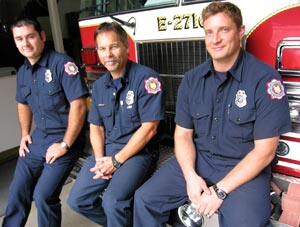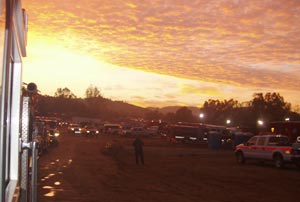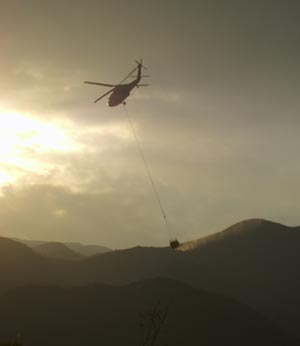When a group of firefighters who'd converged on the recent, deadly Southern California blazes took a break and went to a restaurant, they couldn't get away with paying for their own meal.
Grateful southland residents wouldn't allow them to, despite their protests, said UC Santa Cruz Fire Captain Tim Batinovich, who was one of thousands of fire personnel who traveled to Southern California in late October to help fight the area's destructive wildfires.
"There are a lot of humbling experiences when you go down there, a lot of thank yous," said Batinovich.
The fires caused the largest evacuation in state history, forcing more than half a million people to flee while flames destroyed thousands of homes. At least seven people lost their lives.
UCSC Fire Department's engine 2710 was requested on October 23 as part of the Santa Cruz County Strike Team. UCSC, along with four other Santa Cruz fire agencies, departed for Southern California that afternoon, according to Batinovich. Personnel on engine 2710 were Batinovich, Fire Captain Don Brookes, and firefighters Mike Henley and Johnny Fox.
After arriving, the UCSC unit was assigned to the Grass Valley incident at Lake Arrowhead in San Bernardino County. On the 27th, the unit was reassigned to the Poomacha fire in San Diego County. The firefighters returned to campus on October 30.
The Grass Valley fire burned 1,247 acres and destroyed 174 structures and two outbuildings. One injury was reported. The estimated cost of the fire to date is $6.6 million.
The Poomacha fire started October 23 as a structure fire on the La Jolla Indian Reservation. It burned 49,410 acres and destroyed 138 homes, one commercial property and 78 outbuildings. The blaze caused 15 firefighter injuries and estimated damages of $15.8 million.
UCSC has a small department, with 15 line firefighters, a chief, an assistant chief, a campus emergency planner and a unit administrative coordinator, said Fire Chief Jeff Trapp.
"We're able to participate for a small agency by the people still here filling in on shifts and making sure we have coverage," said Trapp. "It's as much the people who stay behind as the ones who go who make sure the system works."





